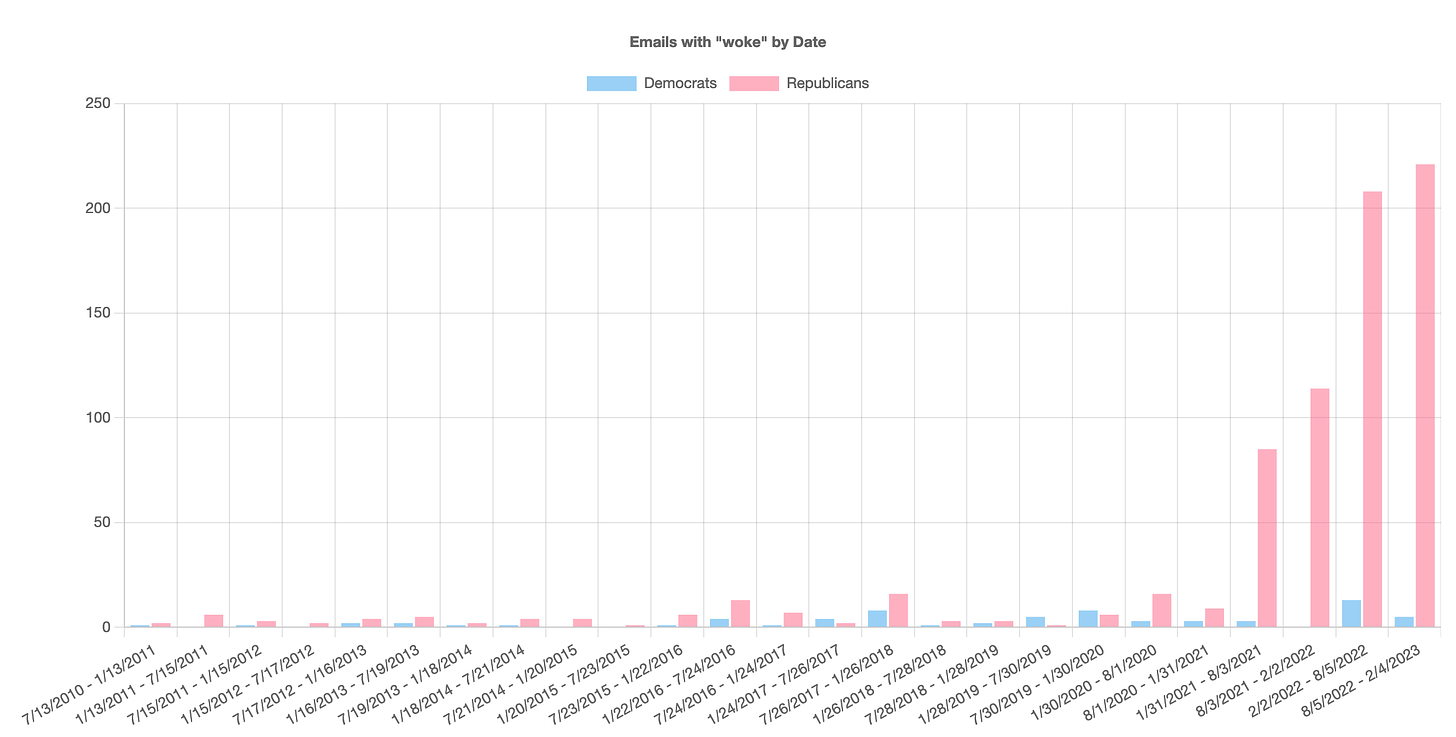The "Woke" "Socialist" "Regime" in Republican Sights
Words matter, and the ones that GOP representatives are emphasizing to their own constituents are trending in a new and dangerous direction.
[I’m traveling to a conference today, so I apologize but this week’s edition of The Connector is shorter than usual. Enjoy!]
What do Members of Congress emphasize when they communicate directly with their constituents back home? Turns out data journalism has an answer, because those newsletters they “frank” into your mailbox for free also have a digital version. And guess what, it’s a window into the heart of the beast that is today’s congressional incumbent, always alert to what the local polls and media are saying, and nimbly shifting their language to demonstrate how “in touch” they are.
Some shifts aren’t surprising. Starting in 2016, for example, uses of the term “LGBTQ” started rising, especially by Democratic representatives. Uses the phrase “civil rights” held pretty steady over the last decade, with an understandable bump upward in 2020. Democrats mention hunger more than Republicans. Mentions of the word “deficit” are more popular among Republicans than Democrats, but they peaked a decade ago. But here’s something new and interesting. Beginning last year, mentions of the word “woke” in official email newsletters sent out by Members of Congress to their constituents took a dramatic leap upward. From just 31 mentions the whole previous congressional year, there were 202 in 2021, all but 3 by Republicans. That clip has doubled again in the past year, to 429 uses of “woke” by GOPers in their newsletters to just 18 by Democrats.
It should be obvious what’s going on. There’s a new bogeyman in town, a vague evil that encompasses all kinds of supposed sins. “Was American teacher left behind in Russian prison camp because he wasn’t woke enough for Team Biden?” Rep. Guy Reschenthaler (R-PA) asked his constituents in December 2022. “Stefanik slams Pentagon for late review of diversity official: ‘Coverup of their radical woke agenda’” Rep. Elise Stefanik (R-NY) boasted to hers that same month. Rep. Scott Fitzgerald (R-WI) informed his folks back home that he was backing the Putting Investors First Act, “to protect consumers investment account[sic] from woke activist shareholder representatives.” Rep. Brian Babin (R-TX) warned his that “The woke mob will never stop. There are two genders: male and female. End of story.”
I’m indebted to Lindsey Cormack, professor of political science at the Stevens Institute of Technology, for this little journey into the current Republican id. Since 2009, she and some of her students have maintained DCinbox.com, a real-time repository of official e-newsletters from every Member of Congress. And I wouldn’t have known about DCInbox if it weren’t for Daniel Schuman’s invaluable First Branch Forecast newsletter, which covers the inner workings of Congress in great detail. In yesterday’s edition, he noted the resolution that overwhelmingly passed the House last week condemning “socialism in all its forms,” including not just the true horrors of Stalin, Mao and their likes but also citing positively the words of Founding Fathers like Jefferson and Madison objecting to any taking of private property by the government to serve others. Schuman wrily wrote that this small act of idiocy “puts the cherry on top of a massive explosion of the use of ‘socialism’ in Republican constituent messaging since the 2018 midterms.” Indeed, charged claims about “socialism” blew up in congressional constituent missives in 2019 and 2020, though not nearly as much as “woke” is exploding now.
The Republicans in the House voted unanimously to condemn “socialism,” joined by 109 Democrats who apparently couldn’t be bothered to remind their constituents that the New Deal programs they love defending so much, like Social Security, or Medicare and Medicaid, or more generally police and fire departments, or public schools and libraries, or the US military, are all examples of socialist programs, in that they all take from each according to their ability (roughly) and give to each according to their need. No matter, even if polls show that socialism is no longer as scary to Americans as in the past, and many young people express interest in it or support it, the current generation of Democratic officeholders aren’t taking chances.
Well, they better get ready for the woke wars. Google Trends show searches on the word “woke” overtook the word “socialism” in January 2021. And Florida Governor Ron DeSantis is making much of the slogan that his state is “where ‘woke’ goes to die.”
Another word has surged in use since the first days of the Biden administration: regime. According to DCInbox, congressional Republicans have used “regime” in their newsletters, with all its connotations of democratic illegitimacy, 1,063 times since the beginning of 2021, ten times as often as Democrats. During the Trump years, Republicans also used the word more often than Democrats, but not nearly as much—the last time it was this high was at the tail end of the Obama administration’s second term. As Cormack notes in a recent commentary on Medium, “the temperature of our politics doesn’t have to be at a boiling point,” but of late many Republicans, especially those at the far-right end of the spectrum, have really been hammering “the authoritarian Biden Regime” for all kinds of supposed failures.
As Cormack writes, “Policy disagreements and claims of policy failure are fair game for political communications, but implying authoritarian activity is not reasonable political discourse. When members of Congress use these terms and actively spread this false sense of authoritarian ‘reality,’ they do harm to the politics of the US. The attempt to make people operate in fear. They set a bad example of how to have hard discussions for politically interested people. They provide the opposite of what we would want as role models for children. Rhetoric that is used to provoke anger and fear under the guise of governance is not a way to get things done. It works to scare people and to make political violence more acceptable, and can even provide what looks like justification for harming others.”
Other Ways of Doing This Thing
—Here’s a very interesting and detailed case-study on how a national citizen assembly, the Citizens’ Climate Council (or “Klimarat”) in Austria, made use of the innovative consensus democracy tool Pol.is. The assembly, which was instigated in response to a popular national petition that got 400,000 signatures, ran from January to July 2022. Somewhere between 5,000 and 6,000 people participated during the Pol.is engagement, submitting more than 5,000 statements and making 833,000 votes on them. Despite some real divisions among participants, Pol.is also uncovered many core areas of consensus on a range of climate mitigation policies.
—Can we get collective progress with democratic participation, or is the only choice for the future to either live in a hyper-capitalist society where technological change outpaces human governance, or a hyper-authoritarian society where one party marshals high tech to maintain social order? The Collective Intelligence Project has just published a fascinating white paper on the prospect it prefers: the development of new kinds of collective intelligence technologies, processes, and institutions that expand a group’s capacity to construct and cooperate towards shared goals. Stop reading here if you think bi-annual elections to legislatures that are easily captured by wealthy interests is the best form of collective problem-solving any society should ever aspire towards. Otherwise, take a dive into the paper, which lays out several ambitious projects: a) Running a citizen’s assembly to understand how to gather and incorporate people’s preferences, in order to align AI systems with a group’s values — starting with the question of deployment decisions related to language models, b) Developing a set of strategies for LLM use in deliberative democracy and testing hypotheses in our partnership with the new discussion platform Narwhal (co-founded by The Atlantic and the Emerson Collective); c) Supporting consortia-based efforts from aligned projects such as pol.is, Talk to the City, the Consilience Project, RadicalXChange, and New Public; and d) Experiments in taking a liquid democracy-based approach to designing recommender systems, with an initial focus on content moderation.
Odds and Ends
—You don’t see the words “activist” and “accountant” next to each other in a sentence that often, right? Well, Kenneth Mejia is one, and he got into politics because of Bernie Sanders’ 2016 campaign. Now he’s also Los Angeles’ city controller and he’s auditing the police department’s giant helicopter air force. Who knew?
—You may remember hearing about Joshua Browder and DoNotPay, an early use of chatbot technology to help people fight minor court battles like disputing parking tickets. Well, Kathryn Tewson has done a deep, deep dive into London and NYC parking ticket records and found there’s no evidence that DoNotPay has helped contest hundreds of thousands of tickets. (Along the way, she also found signs that some NYC parking cops are writing truly bizarre tickets.) File this one under “Tech claims that are too good to be true, AI version of.”
—How do dead people manage to become Democratic party committee members? The answer is in this short documentary about corruption in New York City Democratic party politics and the people who are organizing to fight it.
—Cory Doctorow explains why Netflix’s new anti-password-sharing policy is going to run into trouble; the definition of what makes a “household” is no longer universally shared.
—Need digital training? Sign up for “Building Movement Tech Infrastructure for the Win” for a three-part series of online classes March 22-30.
—Apply: Digital strategy firm Forum One (which is employee-owned, who knew?) is looking to hire a new CEO.
End Times
It’s been a long time since online performance artist Ze Frank made it onto my radar, but it’s a delight to rediscover him.





